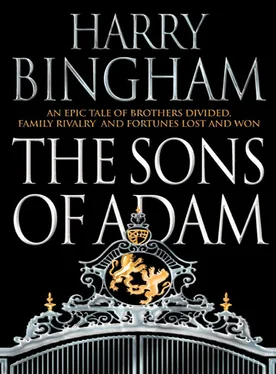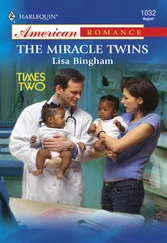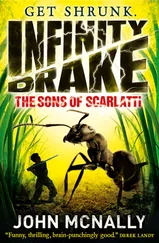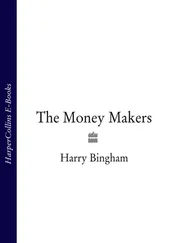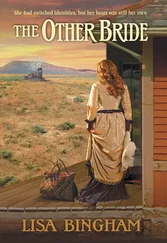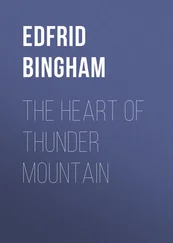‘Raise your right hands, boys … Your right hand, Thompson, not both of them.’
The men silently obeyed.
‘Now lower your hands if you have nippers, any children at all.’
Sixteen hands remained aloft.
‘Put them down if you have a wife … I said a wife, Appleby, not a girl you screw when you’re in the mood.’
Ten hands plus Appleby: eleven.
Tom nodded. ‘You men come here, the rest of you carry on.’ There was complete silence, except for a low muttering as men clambered over each other to exchange positions. (‘Sorry mate’, ‘Careful, that’s my fucking hand you’re treading on’, ‘I’d’ve married the old cow, if I’d known’ …) Eventually the eleven men found their way to Tom – or eleven boys, to be more accurate, since their average age must have been under twenty-one. Tom’s orders required him to take a dozen men, but he’d disobey. A troop of fifty men couldn’t take the guns, and he’d be damned if he’d have more blood on his hands than he absolutely had to. Tom took eleven matches from the box in his breast pocket and broke the heads off two of them. He jumbled the sticks and poked the ends out between his thumb and hand.
‘Each man take a match.’
The men obeyed, and two ended up with the broken-headed sticks: one sandy-haired, stout but strong, and with a confident look to him; the other was a typical inner-city recruit, poorly fed, short – hardly even five foot four – with a long, pale face. Tom didn’t recognise them. Because of the casualties it had suffered so far, the company had been strengthened with other men of the battalion, men Tom didn’t yet know.
‘Sorry, lads, I haven’t got to know your names yet.’
‘Stimson, sir,’ said the sandy-haired lad.
‘Hardwick, sir. The boys call me Shorty,’ said the other.
‘And what would you like me to call you?’
‘Shorty, sir, I suppose. Seems more natural now, like.’
Tom nodded. He took Morgan’s cigarette pack from his pocket and offered the two lads cigarettes. They all three lit up.
‘Now I’ve got good news for you both. I’ve chosen you for a mission, which is going to be difficult and dangerous, but which will mean a medal for each of you, and a thumping great amount of home leave, if I can possibly arrange it. Here’s what we have to do …’
Alan woke up in pain.
Somewhere there was danger; horror even.
He grabbed his revolver and held it out into the darkness, breathing heavily. He listened for shooting. There was nothing, only the continual thunder of distant guns. Half a minute passed. Alan tried to remember where he was.
He felt around him. He was lying on a straw mattress on an iron bedstead.
He could remember Guy sitting with him for some time during the day – or had it been the day before? He was still muzzy and couldn’t remember. He could hear the rustle of straw under him and the quiet sounds of the village beyond the window: a horse grazing, a mechanic trying to start a motorbike. He groped for a match, lit it, then found a candle and lit that.
He stared around the little room, looking for danger. There was nothing. He uncocked his revolver and laid it down.
But waking up had brought no peace. His heart was still beating a hundred and twenty beats to the minute and the sense of appalling tragedy was still with him. He’d have blamed his dreams, except that his sleep had been dreamless and the sense of disaster was stronger now he was awake.
Alan remembered his quarrel with Tom. Pain and anger flashed through him. Tom’s conquest of Lisette had seemed like a deep and deliberate insult. Although Alan had been three-parts delirious when he’d assaulted Tom, he was still deeply angry. But the flash passed. The quarrel was just a quarrel. Tom would apologise and mean it. Alan would take back everything he’d said and he’d mean it too. The quarrel was nothing.
Alan’s heart was racing with something else, something worse, something permanent. For a moment, he didn’t understand. And then he did.
Tom!
Something had happened to Tom.
Alan leaped from bed, found his trousers, groped round for his boots, but couldn’t find them. He remembered that Guy had taken them in an attempt to stop him from wandering, but there was a pair of hobnailed peasant’s shoes lying in the stable below and they would do. He grabbed his tunic, found the shoes, and ran out into the street. His body was absurdly weak still, especially his lungs, but his co-ordination had improved. He walked carefully across to the offices of the transport captain, hoping to borrow a horse.
The captain was there, bent over paperwork, swearing softly to himself. He looked up and broke into a smile. He liked Alan.
‘Well, well. Good evening to you, sir,’ he said, with a smart salute.
‘What?’ said Alan, returning the salute automatically.
‘I see you’ve got your just rewards at last,’ said the captain. ‘Thoroughly well deserved too, I might add.’
Alan looked down at his shoulder. He’d become a major while he’d slept. He shook his head, puzzled. ‘I’ve got my brother’s tunic, I don’t know how. I suppose he must have taken mine by mistake. Look here, can I borrow a horse? I’ll give it back in the morning.’
The captain whistled, sighed, looked at his infinite requisition dockets – but within ten minutes Alan had saddled up and was trotting his way through the darkness, heading for the front line, heading for Tom.
The shooting, when it came, was sudden and clamorous. The guns were barely thirty feet away. By the light of the dim moon, Tom saw the courageous Stimson almost literally disappear as his body was shredded by the hail of bullets. A flare, which followed a second later, was enough to reveal Shorty Hardwick dropping to the ground, as his legs were bloodily cut away from beneath him. The firing continued. Tom reached for a Mills bomb and threw it.
That was the last thing he remembered.
Alan heard the shooting. It lasted for just a minute or two, then died. His horse began stumbling on the churned soil, rearing its head and sidling. He tethered the frightened horse to a shattered tree stump and continued by foot. The days of fighting had left the trenches in hopeless confusion. The ground was bare and shattered. The battlefield stunk of corpses and explosive.
He hurried, slithering down the poorly built trenches, bending double because of the weakness of the parapet. He hadn’t wound puttees over his borrowed shoes and they soon filled with stony mud. His co-ordination and strength were better; only his lungs remained atrocious.
He reached Tom’s section, and there he learned the dreadful worst. He heard of the brigadier’s murderous instructions. He heard that Tom had crept out into no man’s land with his two boys. That after half an hour of silence, the German lines had lit up with fire. That the nearer concrete gun post had opened up with its machine gun. That all three men were missing, presumed dead.
But these still have my garment
By the hem
Earth of Shiraz, and Rukna’s
Silver stream
S’adi (Sheik Moslih Addin, 1184–1291)
Alan stumbled from the dugout into the first chilly signs of dawn. Missing, presumed dead. The world was colossally altered. Alan could have lost both legs with infinitely more calmness than he could bear this hideous truth. Tom was missing, presumed dead.
A sentry was standing on the makeshift fire-step, his face blank with tiredness. ‘Any sign of life out there?’ Alan asked him. His voice was harsh and the pain in his lungs still seemed to be as bad as ever.
Читать дальше
